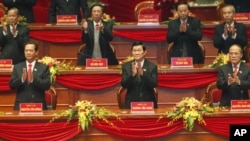Vietnam's ruling Communist Party has opened its 11th National Congress with a blunt assessment of its own shortcomings and a harsh attack on its critics.
Outgoing party General Secretary Nong Duc Manh praised the country's economic development Wednesday in his opening address to the Congress, which will select the country's top leaders and chart its economic path for the next five years.
But he warned that current growth rates may be unsustainable and that companies are lacking in quality, efficiency and competitiveness. He said the country has not been able to reduce corruption and wastefulness, or eliminate "moral and lifestyle degradation."
Manh lashed out at critics just a day after a prominent international human rights group criticized Vietnam for a harsh crackdown on dissidents ahead of the Congress. He said "hostile forces" are using democracy and human rights in an attempt to overthrow the ruling party.
Close to 1,400 delegates are attending the week-long Congress, which is taking place in a capital festooned with red party banners and likenesses of independence leader Ho Chi Minh. They will select a Central Committee, which in turn will appoint a new secretary general to head the de facto ruling 17-member Politburo.
Party members also will decide whether Prime Minister Nguyen Tan Dung is reappointed to the Politburo, which would secure his second term in office.
Carl Thayer, an emeritus professor at the University of New South Wales in Australia, told VOA that one-third of the Central Committee members will be replaced by younger people in what he called a "generational change." But he said the new members will have little influence on policy during their first five-year term.
He said the Congress' main impact on society will be the decisions made about the economy, as the party pursues the goal of making Vietnam a modern industrialized nation by 2020.
Vietnam's economy grew at a 6.8 percent rate in 2010, which was better than government forecasts. But official data show consumer prices rose 11 percent over the same period, while the country's trade deficit grew to more than $12 billion.
Some information for this report was provided by AP, AFP and Reuters.




